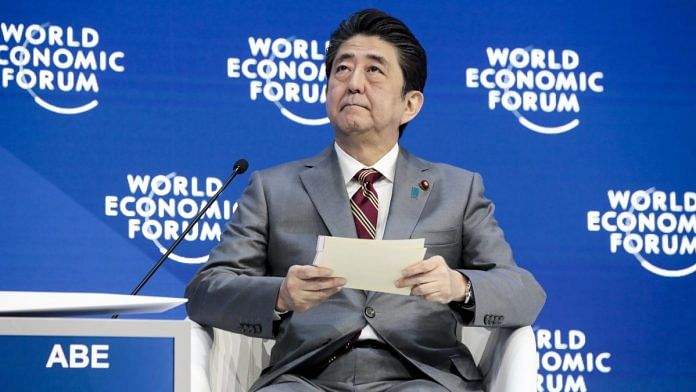The agenda in Davos may be expansive but one clear priority remains at the top of the list: defending the global order.
In speeches at the World Economic Forum’s annual meeting on Wednesday, German Chancellor Angela Merkel, Japanese Prime Minister Shinzo Abe and Chinese Vice President Wang Qishan offered full-throated — and by now largely familiar — defenses of globalization and multilaterism while calling for an end to the trade wars that President Donald Trump has launched.
“Shifting blame for one’s own problems onto others will not resolve the problems,” Wang told delegates in an address that defended globalization as an “inevitable’’ trend and warned the international order was facing “serious challenges” from “unilaterialism, protectionism and populism.”
He didn’t mention either the U.S. or Trump by name, but left little doubt about his targets, at one point calling for a rejection of the “practices of the strong bullying the weak and self-claimed supremacy,”’ a thinly veiled dig at Trump’s “America First’’ foreign policy.
Merkel used her own speech to call on counterparts to pull together to reform the international system, while also urging Trump to embrace the art of compromise he espoused in his previous career in real estate.
“A global architecture will only work if we’re capable of compromise,” she said.
Abe, whose government is about to embark on potentially fraught trade negotiations with the Trump administration and is facing the threat of potential new U.S. auto tariffs, used his time in Davos to declare his government’s backing for “enhancing the free, open, and rules-based international order.”
“I call on all of you, ladies and gentlemen, to rebuild trust toward the system for international trade,” he said.
In a separate meeting with reporters the Japanese prime minister said he also was hoping for the U.S. and China to resolve their trade war, which continues to loom as one of the biggest threats to a global economy that is already slowing.
“I hope President Trump will make a wise decision in the interests of the American people, the interests of the international community and the global economy,’’ Abe said.
For all the focus on Trump, there are plenty of signs too of a growing skepticism toward China, which has done little to build its case as a defender of the global order since President Xi Jinping used an appearance at Davos in 2017 to try and claim that mantle.
In a veiled swipe at Beijing, Abe used his speech to call for change at the World Trade Organization, especially in its rules on government subsidies. Japan has been working with the European Union and the U.S. on a plan to update the rules for industrial subsidies in particular, which many countries believe China has used unfairly to build its economy and introduce a new herd of state-backed corporate giants on the global economy in recent decades.
“There are issues that we would like to see China addressing and resolving,’’ Abe later told reporters.
Also Read: Davos 2019 is all about ‘Globalization 4.0’. So, what is that?
Charm Offensive
China has been on a charm offensive at this year’s forum. “Davos, this lovely small town with its unique appeal, has become an important platform for China to learn about the world,’’ Wang said on Wednesday.
But at a dinner Tuesday with Xiao Yaqing, chairman of the State-owned Assets Supervision and Administration Commission, foreign executives from more than 20 global companies including HSBC Holdings Plc, JP Morgan Chase & Co. and Siemens AG raised concerns about China’s treatment of intellectual property and the Made in China 2025 policy to lead the world in industries such as robotics.
Those issues are the heart of the Trump administration’s complaints about China, which have led the U.S. to impose tariffs on some $250 billion of imports from the nation and will be at the top of the agenda when the two sides meet in Washington next week for negotiations.
In an interview Wednesday, Xiao confirmed that foreign executives had “expressed their concerns on some uncertainties,’’ adding China’s economic slowdown to the list of complaints. Still, he called the dinner a “great gathering.’’ -Bloomberg



